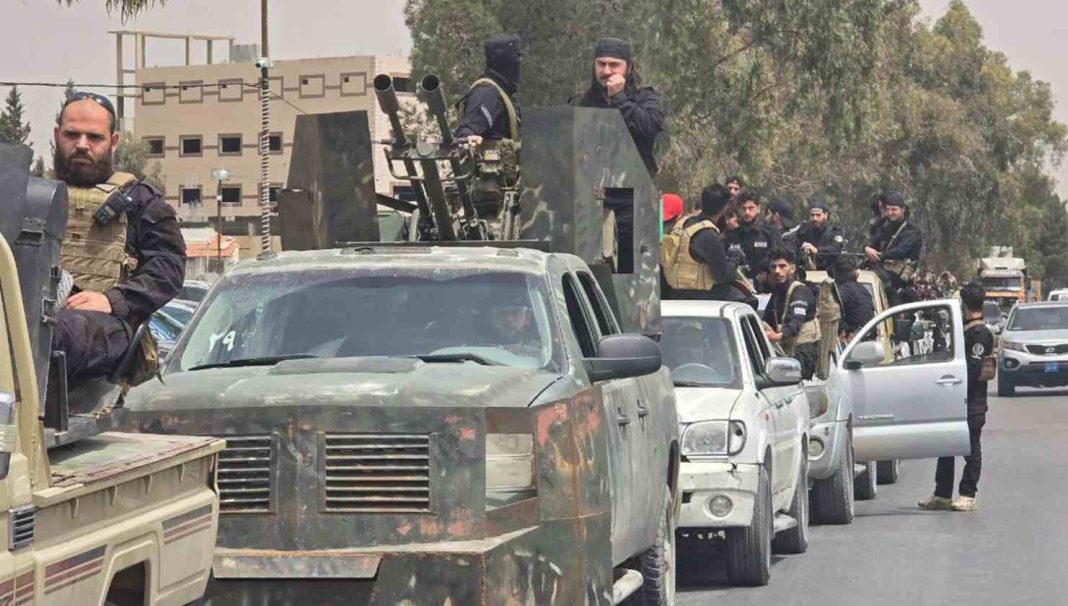A fresh wave of bloodshed in Syria has drawn regional powers into deeper conflict, as Israeli fighter jets launched airstrikes near the Syrian presidential palace in Damascus early Friday. The strikes, confirmed by Israeli Prime Minister Benjamin Netanyahu and Defense Minister Israel Katz, were a direct warning to the transitional Syrian government amid escalating sectarian violence targeting the Druze minority.
“This is a clear message to the Syrian regime,” Netanyahu said. “We will not allow Syrian forces to deploy south of Damascus or any threat to the Druze community.” This marked Israel’s second strike in Syria in just one week, with military sources stating they targeted an area adjacent to the Palace of President Ahmed al-Sharaa. Though details of the mission were sparse, the political intent was unmistakable—deter Damascus from suppressing the Druze.
The attack followed violent clashes between Druze and Sunni gunmen in the town of Jaramana, sparked by an inflammatory audio recording insulting the Prophet Muhammad. Though the Druze cleric accused of making the statement denied involvement, tensions spiraled into armed conflict that claimed dozens of lives. Fighting spilled into nearby Sahnaya, with the Syrian Observatory for Human Rights reporting over 50 deaths, including government security forces and local militias.
A Fragile Regime Faces a Sectarian Reckoning
Since taking power in December after the ousting of longtime ruler Bashar al-Assad, President Ahmed al-Sharaa has promised inclusive governance. Yet his Islamist-led transitional government, composed of former rebel factions and dominated by groups like Hayat Tahrir al-Sham, has struggled to contain sectarian divisions. A former al-Qaeda commander turned politician, al-Sharaa’s leadership remains contested and volatile.
The Druze community, a small religious minority originating from a branch of Shia Islam, has grown increasingly wary. Syrian Druze spiritual leader Sheikh Hikmat Al-Hijri condemned the government’s actions as an “unjustified genocidal attack,” calling for international intervention. With sizable populations in Syria, Lebanon, and the Israeli-occupied Golan Heights, the Druze have emerged as a key concern in Israel’s foreign policy calculations.
Read More: India Blocks Arshad Nadeem’s Instagram
Israel’s leadership views the current Syrian government as a “terrorist coalition” that “took Damascus by force.” The airstrikes signal a broader Israeli strategy: both to prevent hostile forces from encroaching near its borders and to position itself as a protector of minority groups like the Druze. Foreign Minister Gideon Saar called on the international community to “fulfil its role” in protecting these populations from “regime gangs of terror.”
Regional Power Struggles and International Implications
The ongoing violence is testing Syria’s already brittle state apparatus. On Thursday, Syrian Foreign Minister Asaad al-Shaibani urged “national unity” and warned that “any call for external intervention… leads to further deterioration and division.” Yet his appeal comes as the government faces mounting accusations of systemic massacres, including the killing of over 1,700 Alawite civilians—members of Assad’s own sect—in March.
The overlapping layers of sectarianism, insurgency, and foreign intervention have transformed Syria into a fragmented and combustible theater. While the West has largely remained muted in its response, Israel has emerged as the most vocal and forceful actor, projecting itself as both a regional power and a humanitarian stakeholder.
With more than 100 lives lost this week alone and ethnic militias growing increasingly entrenched, the country appears trapped in a dangerous spiral. What began as a political transition has become a proving ground for religious rivalries, geopolitical interests, and the failures of international diplomacy. Whether the latest Israeli strikes will deter further violence or provoke broader conflict remains uncertain—but for the Druze in Syria, the message is clear: they are now a frontline in a much larger battle for the soul of the region.














